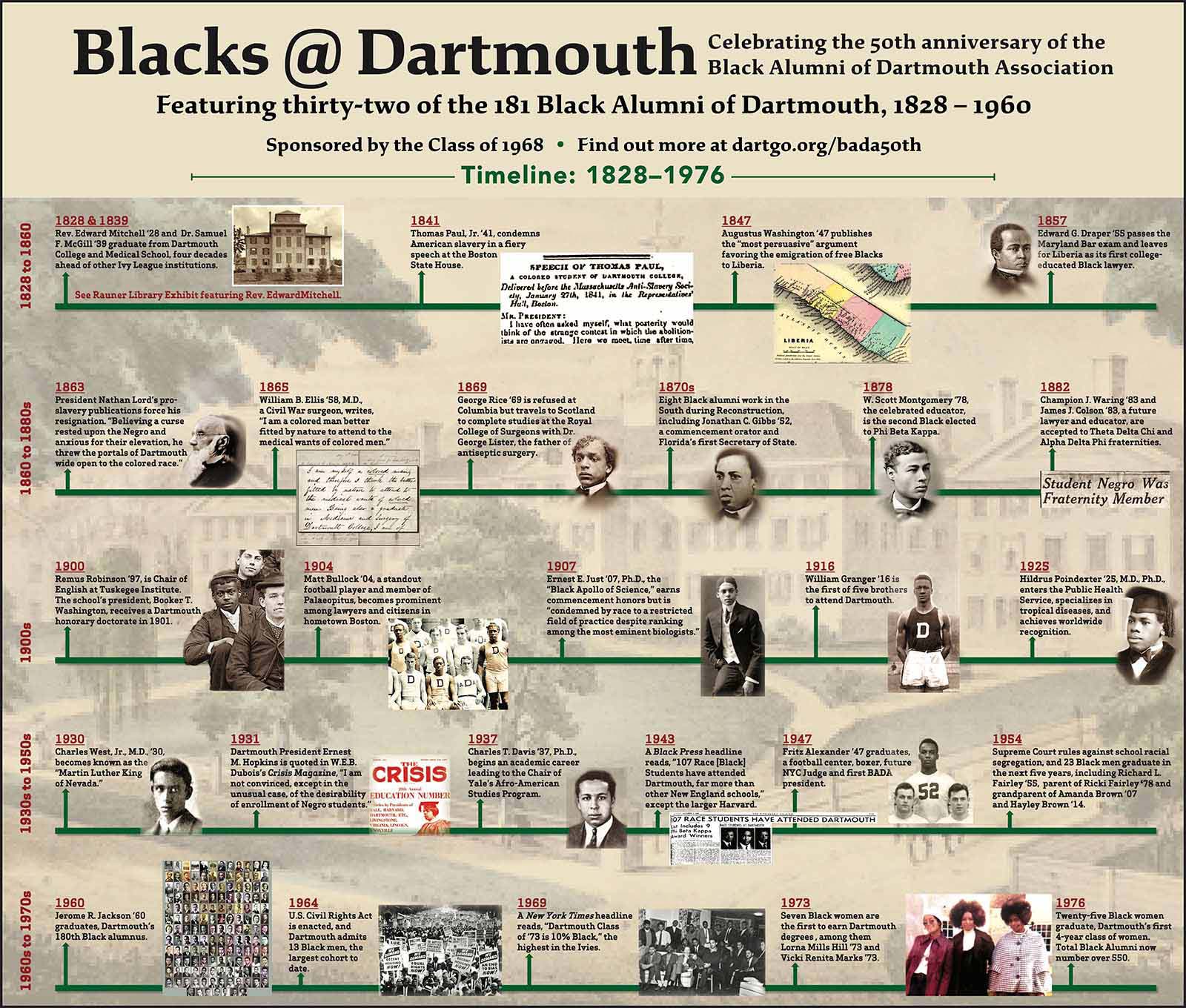Pioneers
Rev. Edward Mitchell '28 and Dr. Samuel F. McGill '39 graduate from Dartmouth College and Medical School, four decades ahead of other Ivy League institutions.
Garrison Abolitionist

Thomas Paul, Jr. '41, joins a Dartmouth antislavery society and delivers a fiery speech at the Boston State House condemning American slavery.
Liberian Colonist

Augustus Washington '47 publishes the "most persuasive" argument favoring African Colonization, emigrates to Liberia, and captures prized daguerreotypes of Liberian citizens. Twelve other Black alumni also emigrate to the free African republic.
A Lawyer for Liberia

Edward G. Draper '55 passes the Maryland Bar exam and is judged to be "qualified in all respects to be admitted to the Bar in Maryland if he was a free white citizen." He emigrates to Liberia as its first college-educated Black lawyer.
President Nathan Lord Resigns

President Nathan Lord, once an abolitionist, publishes pro-slavery articles and is forced to resign his presidency. "Although believing a curse rested upon the Negro, anxious for their elevation, he threw the portals of Dartmouth wide open to the colored race."
Civil War Surgeon

William B. Ellis '58, in applying to serve as a Civil War surgeon at Freedman’s Hospital, writes, "I am a colored man better fitted by nature to attend to the medical wants of colored men."
Studies Medicine in Scotland

George Rice ’69 is refused admission to Columbia's Medical School and completes studies instead at the Royal College of Surgeons in Scotland with Dr. George Lister, the father of antiseptic surgery.
Reconstruction Politician

Eight Black alumni work in the South during Reconstruction, including Jonathan C. Gibbs '52, Dartmouth's 1852 commencement orator and Florida's first Secretary of State in 1872.
Scholar and Educator

Winfield Scott Montgomery '78, born enslaved and rescued at a young age, is the second Black elected to Phi Beta Kappa in 1878. After graduation he became an education leader in Washington D.C. public schools.
First Black Fraternity Brother

Champion James Waring '83, a college athlete and future educator and lawyer, was invited to join the Theta Delta Chi fraternity.
A Consequential Man from Bermuda

Remus Robinson ’97, became Chair of English at Tuskegee Institute, whose president, Booker T. Washington, received a Dartmouth honorary doctorate in 1901.
Athlete and Scholar

Matthew Bullock '04, a standout football player and member of Palaeopitus, became a prominent lawyer and civil rights leader in hometown Boston.
Black Apollo of Science

Ernest E. Just '07, Ph.D., the "Black Apollo of Science," earned commencement honors but was barred from speaking and "condemned by race to a restricted field of practice despite ranking among the most eminent biologists."
Five Brothers
William Granger was the first of five brothers to attend Dartmouth before entering the professions. William , Carl, and Leo Granger became physicians, Lloyd Granger a dentist, and Lester, a National Urban League director whose "contributions were immense and helped alter the course of America.”
International Health Worker

Hildrus Poindexter '25, M.D., Ph.D., M.P.H., the son of formerly enslaved parents, head of Howard Medical School, and a senior surgeon in the Public Health Service, became a world-famous expert on malaria and other tropical diseases.
Physician and Civil Rights Leader

Charles West, Jr., M.D., '30, became known as the "Martin Luther King" of Nevada.
President Hopkins Quoted

Dartmouth President Ernest M. Hopkins is quoted in W.E.B. Dubois’s Crisis Magazine, "I am not convinced, except in the unusual case, of the desirability of enrollment of Negro students." Pictured are six "unusual cases" on the Dartmouth Green in the 1920s.
Afro-American Studies Chair

Charles T. Davis '37, Ph.D., pursued an academic career leading to the Chair of Yale's Afro-American Studies Program.
Black Press Applauds Dartmouth

A Black Press headline reads, "107 Race [Black] Students have attended Dartmouth, far more than other New England schools," except the larger Harvard.
Future BADA President

Fritz Alexander ’47 graduates, a football center, boxer, future NYC Judge and first BADA president.
Brown v. Kansas Board of Education

The Supreme Court rules against racial segregation in public schools and 23 Black men graduate in the next five years, including Richard L. Fairley ‘55. (Pictured: Fairley, daughter Ricki '78, and grand-daughter Amanda Brown Lierman '07')
180th Black Alumn

Jerome R. Jackson '60 graduates, Dartmouth's 180th Black alumnus. Among the alumni are 79 physicians and dentists, 40 educators, 15 lawyers, and 12 businessmen.
Class of 1964

U.S. Civil Rights Act is enacted, and Dartmouth admits 13 Black men, the largest to date. The Dartmouth Afro-American Society (pictured) forms in 1966.
Dartmouth is 10% Black

An NYTimes headline reads, "Dartmouth Class of '73 is 10% Black," the highest in the Ivies. Ninety Black men are admitted to the first year class.
First Black Women

Seven Black women are the first to earn Dartmouth degrees, Brenda K. Funchess, Teri L. Garrett, Lorna M. Hill (pictured), Vicki R. Marks, Wanda J. Powell, Lucinda Stevens, and Leslie G. Wade.
First 4-year class of women graduate

Twenty-five Black women graduate in Dartmouth's first 4-year class of women. Total Black men and women alums now number over 550. (Pictured: Eileen Cave ’76, Karen Turner ’76, JB Redding ’76).
